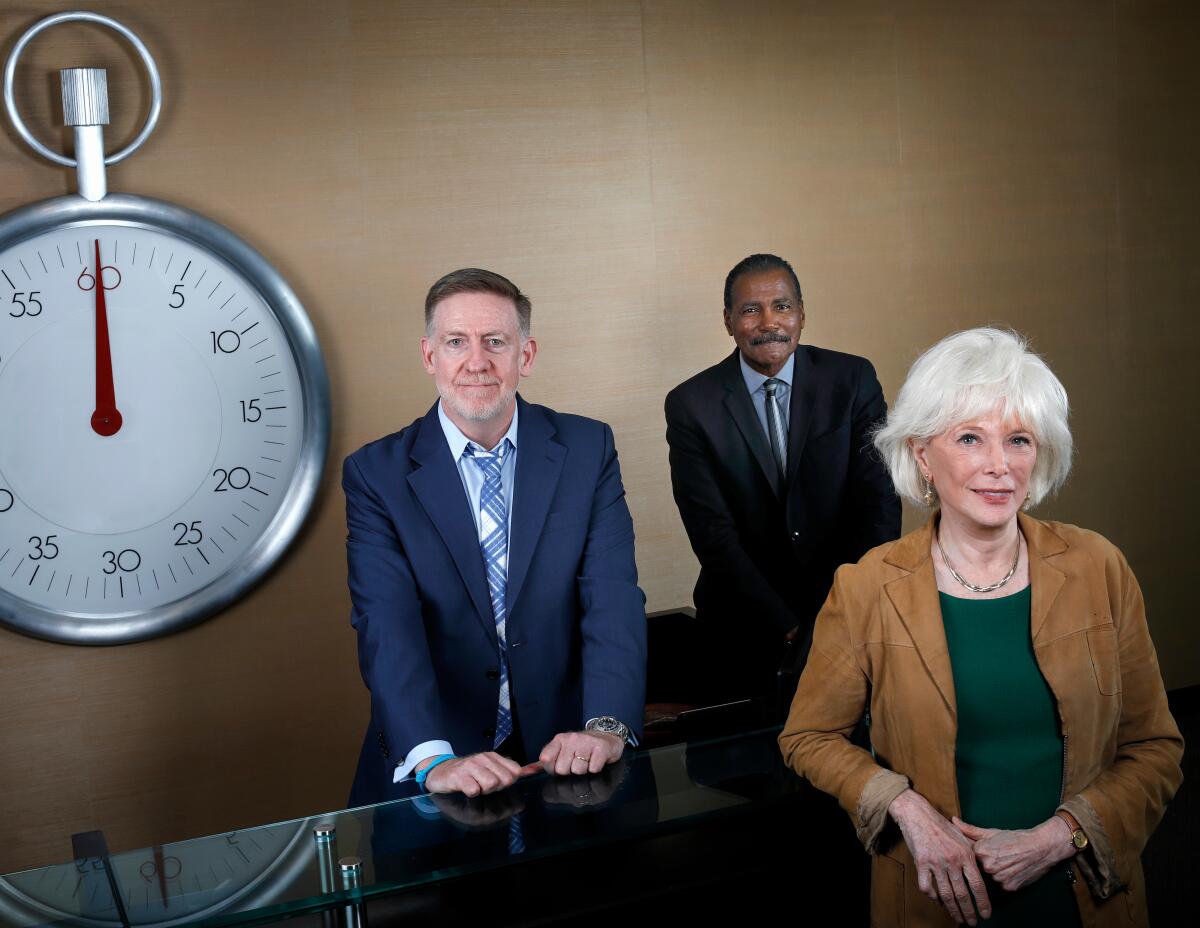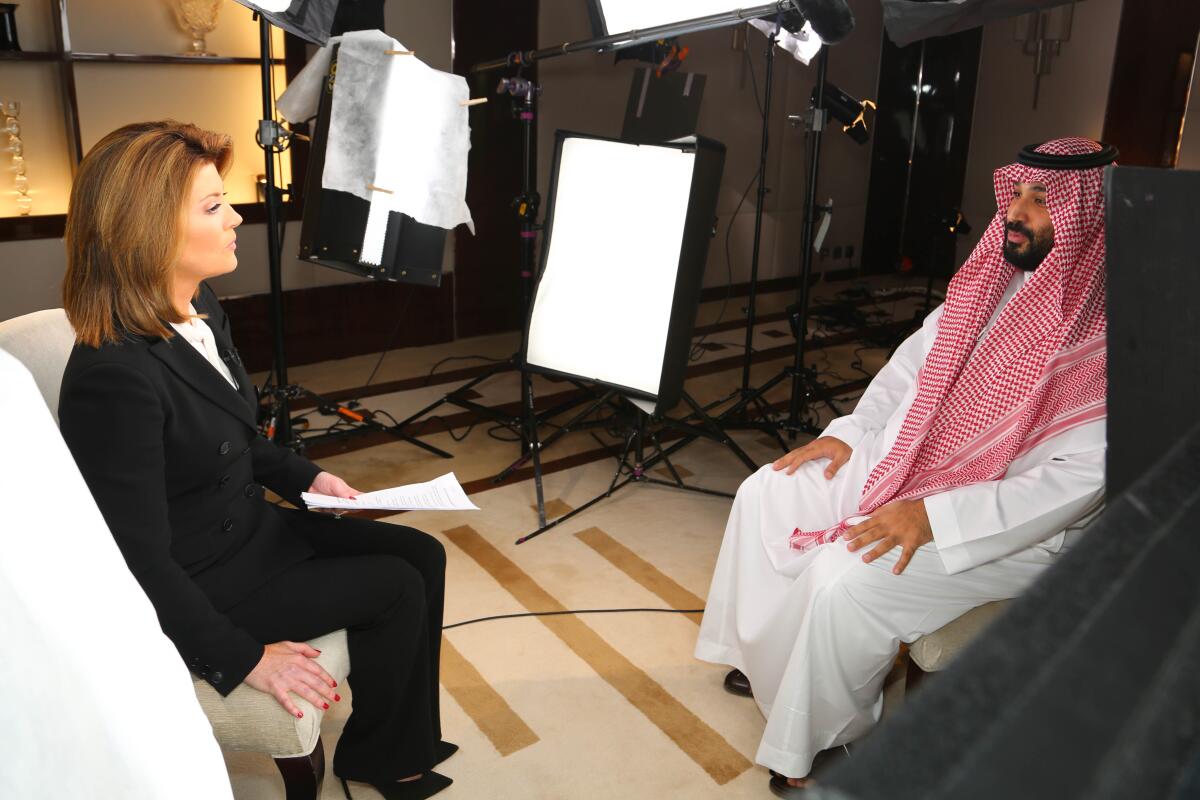A year after a #MeToo scandal, ‘60 Minutes’ keeps its viewers and stature

- Share via
Winning statuettes at the News & Documentary Emmy Awards is nothing new for the venerable CBS newsmagazine “60 Minutes.” The five won by the program on Tuesday brought its total up to 159 over its long run.
But it’s rare that a former boss who lost his job during last year’s wave of #MeToo accusations gets acknowledged by the winners at the lectern.
The gratitude expressed for former “60 Minutes” executive producer Jeff Fager — who was ousted in September 2018 while under investigation for inappropriate workplace conduct — shows just how traumatic his loss was to the crown jewel of CBS News.
The implosion, which came days after longtime former CBS chief Leslie Moonves was fired over sexual-misconduct allegations, was followed by months of turbulence at the news division, driven in part by speculation over who would lead the program.
But the “60 Minutes” staff, many of whom have been on board for decades, proved resilient. “60 Minutes” finished in Nielsen’s weekly top 10 prime time 23 times and ranked first in three of those weeks during the 2018-19 season. Along with the Emmys, it won a prestigious DuPont Award for correspondent Bill Whitaker’s investigation into the opioid crisis.
While the audience is mostly older viewers, the program’s authoritative reputation is still desirable to advertisers — the average price for a 30-second ad was $106,000 last season, about even with the previous year according to Standard Media Index.
For Bill Owens, the program’s longtime executive editor who took over after Fager’s dimissal, the transition wasn’t easy because of Fager’s stature.
A report in the New Yorker said Fager groped women at company parties and tolerated bad behavior by other producers. He denied the claims but was fired in September 2018 after sending what management believed was an intimidating text to a CBS News correspondent who reported on the matter. (Fager asserted at the time that he was asking the reporter to be fair in her coverage.)
Unlike many of the other men who have been brought down by the #MeToo movement, Fager was liked and respected by many of his coworkers. He was the operation’s strong-willed editorial force and chief defender against attempts to tamper with the program’s successful formula and cut costs.
“This was unexpected and it hit us hard,” said Whitaker, who was brought onto the program by Fager five years ago and has become its most prolific and versatile correspondent.
On the night of Fager’s firing, dozens of colleagues took him out for cocktails. There were tears and expressions of fear that the program might not survive his removal.
“It was painful for everybody and it was painful for me because I have my personal friendship with Jeff,” said “60 Minutes” correspondent Lesley Stahl, who joined the program in 1991.
Owens’ first task as Fager’s interim replacement was to make sure the emotionally shaken staff’s uncertainty about the future did not show up onscreen.
“People were shocked and sad,” Owens recalled in a recent interview at his office. “The day after Jeff was fired I gathered everybody together and I said, ‘The only thing we control right now is the journalism, so week by week the audience has to turn on the program at 7, or get it on the app, and see “60 Minutes.” There can’t be even a moment of hesitation, like, “Well, what are they doing?” We have to look like our best selves.’ ”
Owens pressed ahead on the pieces planned for the new season while New York tabloid gossip pages reported on whether he would get the “60 Minutes” executive producer job permanently or see it go to Susan Zirinsky, who ultimately became his boss when she took over as president of CBS News in January.
Owens had the backing of his staff, as he was instilled with Fager’s journalistic and production values after working alongside him for years. Familiarity helped as well, as even executives from CBS News headquarters located across West 57th Street are considered outsiders in the closed society of “60 Minutes.”
But the public perception of a bake-off between Owens and Zirinsky created an uneasy atmosphere for the longtime friends and colleagues.
“It wasn’t comfortable for my family and I’m sure it wasn’t comfortable for her family,” Owens said. “But it’s sort of like crashing a story during a big news story — you have to just focus on the story and not let the distractions get to you. And I tried my best to do that.”
The issue of Fager’s successor was resolved when CBS Corp. Chief Executive Joe Ianniello named Zirinsky president of CBS News in January, replacing David Rhodes.
Zirinsky quickly dropped “interim” from Owens’ executive producer title in February. She said in an interview that he is her main “sounding board” inside the division along with Rand Morrison, executive producer at “CBS Sunday Morning,” and executive vice president of news Kim Godwin.
“Bill had a lot of support at ‘60,’” Zirinsky said. “There was a steadiness to him. A kind of Zen-like strength. He could not only take the baton and run with it but make changes as well.”
The program’s correspondents say Owens has a more collegial style than his predecessors. “When we are in the screening room looking at pieces there is more free-flowing discussion now,” said Whitaker.
Owens, 52, a Long Island, N.Y., native who started out at CBS News in 1988 as a freelance desk assistant at the network’s New York station, wants to protect elements that make “60 Minutes” distinctive from its competitors.
The program will still spend more than $100,000 on a single story and sends its correspondents to every continent over the course of a TV season. This week “CBS Evening News” anchor and “60 Minutes” correspondent Norah O’Donnell headed to Saudi Arabia for a rare U.S. interview with Crown Prince Mohammad bin Salman to air Sunday on the program’s 52nd season premiere.
Andrew Heyward, a former CBS News president and currently a research professor at the Walter Cronkite School of Journalism at Arizona State University, said the “60 Minutes” approach to deeply researched pieces on serious subjects stands out even more at a time when other network newsmagazines such as NBC’s “Dateline” focus more on true-crime stories, and political debate dominates cable news.
“The program has a very good sense of itself,” Heyward said. “Its consistency and its resistance to any temptation to tart it up or dumb it down over the years has proven to be a virtue.”
Owens said he will not alter the signature style of “60 Minutes” as long as he is in charge.
“I don’t have any interest in changing anything about the way ‘60 Minutes’ tells its stories and I won’t,” he said. “If someone makes a decision somewhere down the line that that’s something they want to do, they’ll find someone else to do that.”
But while the editorial and production standards won’t change, Owens is actively exploring ways to expand the reach of “60 Minutes” on digital platforms as people under 50 are moving away from traditional TV viewing. “We need to reach a younger audience who is hungry for good storytelling and important stories,” he said. “And we can do a better job of that.”
Owens also has the task of trying to adjust the culture of the “60 Minutes” workplace in light of the events of last year. He knows firsthand that it long had an environment that could be clubby and inhospitable.
“It was sort of coldblooded,” said Owens, who joined the program in 2003. “That’s what I remember. Nobody welcomed you. Nobody said hello. You were seen as a competitor even though you were on the [same] floor. And it would sort of make me laugh how people would kind of sneer at you and not make eye contact and all that.”

Owens said CBS News has added human resources personnel since the investigation into sexual-misconduct allegations at the company last year and has implemented his own “open-door policy” to encourage employees to speak up on workplace problems. In 2017, former “60 Minutes” correspondent Charlie Rose was fired after the Washington Post reported on harassment allegations from staffers at his PBS talk show.
“We didn’t have enough people throughout the corporation to handle any issues that might come up,” he said. “That’s no longer the case.”
An outside legal investigation into sexual misconduct at “60 Minutes” found that the culture at the program was far worse under its late founding executive producer Don Hewitt, who handed the reins to Fager in 2004.
Owens said his workplace philosophy boils down to a single word — respect.
“I think it covers everything,” he said. “There needs to be respect among, you know, producers and their associate producers. Everybody needs to know what their job is. Doesn’t mean you can’t have disagreements or even lose your temper from time to time. It’s OK to say, ‘I’m sorry, I was having a bad day.’”
Owens and Zirinsky say they are continuing to bring more women into the program’s upper ranks. Longtime producer Tanya Simon — the daughter of the late correspondent Bob Simon — was elevated to executive editor. Owens’ other top lieutenants are Claudia Weinstein, executive story editor, and Debbie De Luca Sheh, senior broadcast producer, both of whom were promoted during Fager’s tenure.
Stahl, now the most tenured correspondent at “60 Minutes,” said she has never been subjected to harassment during her 28 years at the program. But as part of the pioneering class of female journalists who entered network news in the early 1970s, she is glad to see women standing up to behavior that was once accepted.
“They are braver than we were,” Stahl said. “When I was coming into the business, we had men chasing us around the desks. But we never said anything. It was the way it was and that was it. What’s happening now is so welcome. I salute them. I support them.”
More to Read
Inside the business of entertainment
The Wide Shot brings you news, analysis and insights on everything from streaming wars to production — and what it all means for the future.
You may occasionally receive promotional content from the Los Angeles Times.










